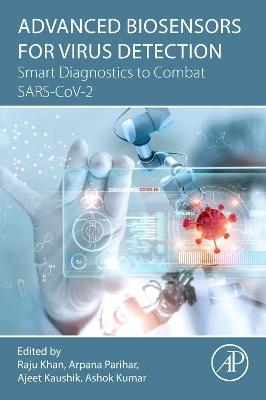
Advanced Biosensors for Virus Detection
Academic Press Inc (Verlag)
978-0-12-824494-4 (ISBN)
In addition, current therapeutics, nano-abled advancements and challenges in the detection of SARS-CoV2 and COVID-19 management are discussed, along with the role of nanomaterials in the development of biosensors and how biosensors can be scaled up for clinical applications and commercialization.
Raju Khan is a Senior Principal Scientist and Professor, at CSIR-Advanced Materials and Processes Research Institute, Bhopal. He did his PhD in Chemistry in 2005 from Jamia Millia Islamia, Central University, New Delhi, and Postdoctoral researcher at the “Sensor Research Laboratory University of the Western Cape, Cape Town. His current research involved synthesizing novel materials to fabricate electrochemical and fluorescence-based biosensors integrated with microfluidics to detect target disease risk biomarkers for health care monitoring. He has published over 150 papers in SCI journal, which attracted over 5500 citations as per Google Scholar, published 45 book chapters in the reputed book Elsevier and Taylor Francis, editing of 28 books from Elsevier and Taylor Francis, and his research has been highlighted in Nature India. He has supervised 5 PhD and 30 undergraduate/postgraduate theses and has supervised 4 numbers of postdoctoral fellows under the scheme of N-PDF, CSIR-Nehru Fellowship, and DST-Women Scientist Projects. Arpana Parihar is a DST Scientist B at CSIR-Advanced Materials and Processes Research Institute (AMPRI), Bhopal, India. She has 8 years of research and teaching experience and her current research interests include fabrication (Micro/Nano-fabrication) of Bio-devices/bio-medical POCT Devices for early diagnosis of cancer and infectious disease. She has gained significant expertise in the field of 3D cell culture, drug designing, tissue engineering, photodynamic therapy, molecular dynamic simulations, and immunoinformatics. Dr. Ajeet Kaushik is Associate Professor at the NanoBioTech Laboratory, Department of Environmental Engineering, Florida Polytechnic University, USA. He is the recipient of various reputed awards for his service in the area of nano-biotechnology for health care. He has edited seven books, written more than 100 international research peer reviewed publications, and has three patents in the area of nanomedicine and smart biosensors for personalized health care. In the course of his research, Dr. Kaushik has been engaged in the design and development of various electro-active nanostructures for electrochemical biosensor and nanomedicine for health care. His research interests include nanobiotechnology, analytical systems, design and develop nanostructures, nano-carries for drug delivery, nano-therapeutics for CNS diseases, on-demand site-specific release of therapeutic agents, exploring personalized nanomedicines, biosensors, point-of-care sensing devices, and related areas of health care monitoring. Dr. Ashok Kumar is currently working as an Associate Professor in the Department of Biochemistry of All India Institute of Medical Sciences Bhopal. His current research interest is understanding the role of non-coding RNAs and sphingosine-1-phosphate signaling in Head and Neck Cancer. He received his PhD degree from Sanjay Gandhi Postgraduate Institute of Medical Sciences (SGPGIMS) Lucknow, India. Then, he received postdoctoral training from UCSFBenioff’s Children’s Hospital Oakland & Research Centre, Oakland, CA, USA. Dr. Ashok Kumar’s major area of research work are Cell & Molecular Biology, Cancer Biology, Immunology & Sphingolipid signaling. He has more than 15 years of research experience. He has published more than 50 research articles and 10 book chapters and he has edited two books. He is a member of several international professional societies including American Association of Cancer Research and Fellow of Royal Society of Biology
1. Emergence of coronavirus epidemic and pandemic 2. Emergence of novel coronavirus (SARS-COV-2) and global public health response 3. Lessons learned from coronavirus (SARS-CoV, MERS-CoV and SARS-CoV2) and Socio-economic impact of (SARS-COV-2) pandemic 4. Current therapeutics for COVID-19 management 5. Exploring SARS-COV-2 genomic profiling and strain variation 6. Profiling and pathogenesis of SARS-CoV2 7. Nano-enabled advancements in COVID-19 management 8. Challenges in SARS-CoV2 detection needed to management COVID-19 pandemic 9. State-of-the-art diagnostic to manage coronavirus epidemic and pandemic 10. Biomarkers and risk factors associated with coronavirus infection 11. Protein Biomarkers 12. Genomic Biomarkers 13. Patients fluid as antibody 14. Biological/Synthetic Receptors used for Biosensors development for coronavirus detection (a) Antibody based (b) Enzyme based (c) Aptamer based 15. Electrochemical biosensors for viral infection diagnostics 16. Optical Biosensors for viral infection diagnostics 17. Calorimetric Biosensors for viral infection diagnostics 18. Role of Magnetic nanoparticles in development of Biosensors for viral infection diagnostics 19. Advances in nanomaterials for biosensor development for virus detection 20. Multiplexed biosensors for virus detection 21. Acoustic/electrical biosensors for diagnostic approaches 22. Role of mechanical biosensors in diagnostic approaches 23. Fluorescence Based Biosensors for coronavirus infection diagnostics 24. Raman based biosensors for coronavirus infection diagnostics 25. Miniaturized analytical system for Point-of-care coronavirus infection diagnostics 26. Microfluidic Device with Integrated Biosensors for coronavirus infection diagnostics 27. Currently available Biosensor based approaches for SARS-CoV-2 detection 28. Biosensors based approaches for other viral infection detection 29. Lab-on-chip devices for coronavirus infection diagnostics 30. Scaling up of biosensors for clinical applications and commercialization 31. Future aspects of biosensor-based devices in disease detection
| Erscheinungsdatum | 02.02.2022 |
|---|---|
| Zusatzinfo | Approx. 100 illustrations; Illustrations |
| Verlagsort | San Diego |
| Sprache | englisch |
| Maße | 191 x 235 mm |
| Gewicht | 1000 g |
| Themenwelt | Naturwissenschaften ► Biologie ► Mikrobiologie / Immunologie |
| ISBN-10 | 0-12-824494-1 / 0128244941 |
| ISBN-13 | 978-0-12-824494-4 / 9780128244944 |
| Zustand | Neuware |
| Haben Sie eine Frage zum Produkt? |
aus dem Bereich


